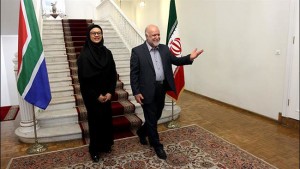Tehran, Iran | – Iran and South Africa agreed to build petrochemical plants and oil refineries through joint ventures.

Iran’s Minister of Petroleum Bijan Namdar Zangeneh welcomes South Africa’s Energy Minister Tina Joemat-Pettersson
The agreement was reached during a meeting between Iranian Oil Minister Bijan Zanganeh and South African Energy Minister Tina Joemat-Pettersson in Tehran on Saturday.
During the meeting, the two sides also discussed oil and energy cooperation, including resumption of crude exports.
“Iran supplied 40% of South Africa’s oil imports before sanctions brought them to zero,” Zangeneh said, adding that “we are currently seeking to open this closed path and there are negotiations underway which we hope will bear result.”
“Right now, the main argument is over the price. Iran has announced that it will accept a price which is competitive in the market,” Zangeneh said.
He also said South African President Jacob Zuma is to visit Iran on Sunday and Monday to “strengthen bilateral relations between the two countries.”
Zangeneh said the two sides are expected to sign a memorandum of understanding for energy cooperation on Sunday.
“A technology cooperation agreement is expected to be signed for boosting technical knowledge in the field of GTL with the Research Institute of Petroleum Industry,” he said.
Pretoria is also considering building an oil refinery that will process Iranian crude to bolster its petrol supply and reduce its dependence on foreign companies.
“We have asked them to present their proposals. Accordingly, Iran has invited them to invest in Iran’s refining and petrochemical sector like before,” Zangeneh said about the plan.
South African petrochemicals group Sasol had a 50% stake in Arya Sasol Polymer company, a joint venture with Pars Petrochemical Company of Iran. The venture produced ethylene and polyethylene used in the production of plastics.
“Arya Sasol used to carry out successful investment operations in Iran’s petrochemical industry but had to pull out of them after sanctions,” Zangeneh said.
Elsewhere in his remarks, Minister Zangeneh said Iran will support any initiative to stabilize the oil market after recent talks in Qatar failed to freeze production.
Zangeneh told reporters on the sidelines of the meeting with his South African counterpart in Tehran on Saturday that the meeting between OPEC and non-OPEC producers in Doha was a “good step.”
“Despite failing to have a result, the start of the negotiation was good for OPEC and non-OPEC to cooperate and for big OPEC producers to accept that they have to do something to change the situation,” he added.
OPEC, Russia and Mexico failed to come up with any decision at last Sunday’s meeting after Saudi Arabia demanded that Iran join in an output freeze despite calls on Riyadh to save the agreement and help prop up crude prices.
Zangeneh said despite the collapse of the Doha agreement, oil prices did not extend their losses.
“The market momentum and the will of both producers and consumers is that oil prices increase on the global level,” he said.
Iran has been ramping up production following the lifting of Western sanctions in January to claw back its market share.
On Saturday, Zangeneh said Iran is close to the export levels before the sanctions.
“Iran’s oil production has approached very close to the level before sanctions and our oil output has increased by 1 million barrels per day after the cancellation of the sanctions,” he said.
“This trend will continue until Iran’s market share reaches the level before the sanctions,” Zangeneh added.


